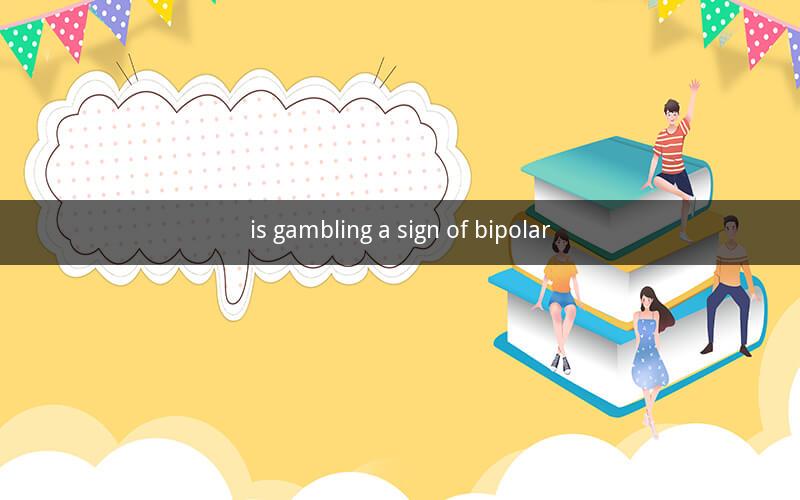
Is Gambling a Sign of Bipolar Disorder?
Table of Contents
1. Understanding Bipolar Disorder
2. The Link Between Gambling and Bipolar Disorder
3. Symptoms of Gambling in Bipolar Patients
4. Causes of Gambling in Bipolar Disorder
5. Treatment and Management of Gambling in Bipolar Disorder
6. The Importance of Early Intervention
7. Conclusion
1. Understanding Bipolar Disorder
Bipolar disorder, also known as manic-depressive illness, is a mental health condition characterized by extreme mood swings that include periods of elevated mood, known as mania or hypomania, and periods of depression. These mood swings can significantly impact a person's daily life, relationships, and work.
2. The Link Between Gambling and Bipolar Disorder
Gambling has been identified as a potential sign of bipolar disorder. While not all individuals with bipolar disorder engage in gambling, research has shown that a significant number of those with the condition may develop gambling problems. This link can be attributed to the mood swings and impulsivity often associated with bipolar disorder.
3. Symptoms of Gambling in Bipolar Patients
Gambling behavior in bipolar patients can manifest in various ways, including:
- Excessive and uncontrolled gambling, often leading to financial, legal, or personal problems.
- A preoccupation with gambling, which may interfere with daily responsibilities and relationships.
- Risky gambling, such as betting large sums of money or taking part in high-stakes games.
- A need to increase the amount of money or time spent gambling to achieve the desired thrill or excitement.
- Attempts to stop or control gambling, but being unsuccessful.
4. Causes of Gambling in Bipolar Disorder
The causes of gambling in bipolar disorder can be complex and multifaceted. Some potential factors include:
- Impulsivity: Bipolar disorder is often associated with impulsivity, which can lead to risky behaviors such as gambling.
- Manic phases: During manic phases, individuals may experience increased energy, confidence, and a sense of invincibility, which can lead to excessive gambling.
- Genetic predisposition: Research suggests that there may be a genetic component to both bipolar disorder and gambling addiction.
- Environmental factors: Stress, trauma, and other environmental factors can contribute to the development of gambling problems in individuals with bipolar disorder.
5. Treatment and Management of Gambling in Bipolar Disorder
Treating gambling problems in individuals with bipolar disorder requires a comprehensive approach that addresses both the mental health condition and the gambling behavior. Some treatment options include:
- Medication: Antidepressants, mood stabilizers, and other medications can help manage mood swings and reduce impulsivity.
- Psychotherapy: Cognitive-behavioral therapy (CBT) and other forms of therapy can help individuals develop coping strategies and address underlying issues contributing to their gambling problems.
- Support groups: Support groups, such as Gamblers Anonymous, can provide individuals with a sense of community and tools to help them overcome their addiction.
- Financial counseling: Financial counseling can help individuals manage their finances and reduce the impact of gambling on their lives.
6. The Importance of Early Intervention
Early intervention is crucial in addressing gambling problems in individuals with bipolar disorder. By seeking treatment early, individuals can minimize the negative impact of their gambling behavior and improve their overall quality of life. Early intervention also helps prevent potential legal and financial consequences associated with excessive gambling.
7. Conclusion
Gambling can be a sign of bipolar disorder, particularly in individuals who exhibit impulsivity and mood swings. Recognizing the link between these conditions is essential for effective treatment and management. Early intervention, a comprehensive treatment approach, and support from family, friends, and professionals can help individuals with bipolar disorder overcome their gambling problems and lead healthier, more fulfilling lives.
Questions and Answers
1. Q: What is bipolar disorder?
A: Bipolar disorder is a mental health condition characterized by extreme mood swings, including periods of elevated mood (mania or hypomania) and periods of depression.
2. Q: Can all individuals with bipolar disorder engage in gambling?
A: No, not all individuals with bipolar disorder engage in gambling, but a significant number may develop gambling problems due to mood swings and impulsivity.
3. Q: What are the symptoms of gambling in bipolar patients?
A: Symptoms include excessive and uncontrolled gambling, preoccupation with gambling, risky gambling, a need to increase the amount of money or time spent gambling, and unsuccessful attempts to stop or control gambling.
4. Q: What are the causes of gambling in bipolar disorder?
A: Causes include impulsivity, manic phases, genetic predisposition, and environmental factors such as stress and trauma.
5. Q: How can gambling be treated in individuals with bipolar disorder?
A: Treatment includes medication, psychotherapy, support groups, and financial counseling to address both the mental health condition and the gambling behavior.
6. Q: Why is early intervention important in treating gambling problems in bipolar disorder?
A: Early intervention helps minimize the negative impact of gambling behavior, prevent legal and financial consequences, and improve overall quality of life.
7. Q: Can medication alone treat gambling problems in individuals with bipolar disorder?
A: While medication can help manage mood swings and impulsivity, it is often not sufficient on its own to treat gambling problems. A comprehensive treatment approach is typically required.
8. Q: Are there any support groups for individuals with bipolar disorder and gambling problems?
A: Yes, support groups such as Gamblers Anonymous can provide individuals with a sense of community and tools to help them overcome their addiction.
9. Q: Can stress and trauma contribute to gambling problems in individuals with bipolar disorder?
A: Yes, stress and trauma can be contributing factors to the development of gambling problems in individuals with bipolar disorder.
10. Q: How can family and friends support individuals with bipolar disorder and gambling problems?
A: Family and friends can provide emotional support, encourage treatment, and help individuals develop healthy coping strategies to manage their gambling behavior.